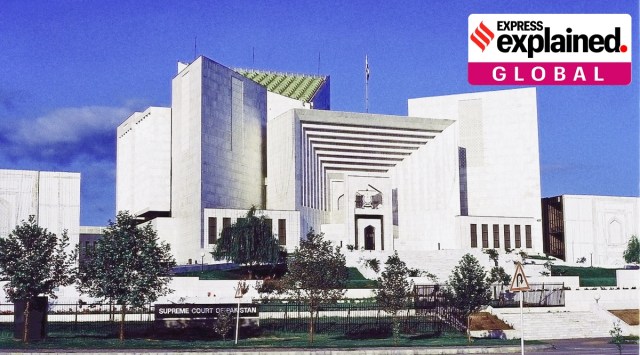Pakistan Bill to curb Chief Justice’s powers: What does it say, how it can impact Nawaz Sharif’s case
What does the Supreme Court (Practice and Procedure) Act, 2023 propose, what caused tensions between the Chief Justice and the Pakistan govt, and what is likely to happen now?
 The National Assembly has passed a Bill aimed at curbing the discretionary powers of the Chief Justice of Pakistan. (Photo of the Supreme Court of Pakistan by Usman.pg via Wikipedia)
The National Assembly has passed a Bill aimed at curbing the discretionary powers of the Chief Justice of Pakistan. (Photo of the Supreme Court of Pakistan by Usman.pg via Wikipedia) Days after Pakistan Prime Minister Shehbaz Sharif said “history would not forgive us” if the powers of the country’s top judge were not curtailed, the Senate (Upper House of the bicameral Parliament) Thursday (March 30) passed a Bill aimed at curbing the discretionary powers of the Chief Justice.
The National Assembly, or the Lower House, had approved the Bill on Wednesday. A day before, it had passed a resolution accusing the Supreme Court of “judicial activism”. “This house believes that an unnecessary intrusion of the judiciary in the political matters is the main cause of political instability,” the resolution said, amid an ongoing standoff between Pakistan’s government and sections of the judiciary.
The Opposition Pakistan Tehreek-e-Insaf (PTI) has criticised the Bill, with party chief and former Prime Minister Imran Khan tweeting, “Cabal of crooks attempts to attack the Supreme Court of Pakistan as well as undermine its powers is being and will continue to be resisted by the people of Pakistan.”
Cabal of crooks attempts to attack the Supreme Court of Pakistan as well as undermine its powers is being and will continue to be resisted by the people of Pakistan.
— Imran Khan (@ImranKhanPTI) March 29, 2023
What does the Supreme Court (Practice and Procedure) Act, 2023 propose, what caused tensions between the Chief Justice and the government, and what is likely to happen now?
What does the Bill say?
The Bill has three crucial provisions — what suo motu cases can be taken up will be decided by a committee consisting of the Chief Justice and two other senior most judges instead of only the Chief Justice; benches to hear these cases will also be decided by the committee instead of the top judge, where any case that involves interpreting the Constitution will not have a bench with fewer than five judges; and decisions made in such cases will be open to appeals.
The Constitution of Pakistan provides for “Original Jurisdiction of Supreme Court” under Article 184. Suo motu cases are taken up under Article 184 (3), where the SC can take up a case “if it considers that a question of public importance with reference to the enforcement of any of the Fundamental Rights” is involved. So far, matters under this were directly at the discretion of the Chief Justice.
Law Minister Azam Nazeer Tarar, speaking in the National Assembly, said, as quoted by the newspaper Dawn, “In the past it has been observed that suo motu notice had been taken on petty matters like lack of parking space outside a hospital, submerging of a street in rainwater, or recovery of a bottle from an accused. Therefore, it is the need of the hour to form a mechanism to ensure transparency.”
 Law Minister Azam Nazeer Tarar speaks in the National Assembly, Islamabad on March 30, 2023. (Twitter/NAofPakistan)
Law Minister Azam Nazeer Tarar speaks in the National Assembly, Islamabad on March 30, 2023. (Twitter/NAofPakistan)
He added, “Presently, there is no right of appeal in suo motu cases but in the proposed Bill we have given the right to the accused to file intra-court appeal within 30 days,” he added.
Crucially, this right is also applicable retrospectively, and aggrieved parties can move court “within 30 days of the commencement of this Act”. This has the scope of opening up a plethora of legislation — even Nawaz Sharif was disqualified from holding public office in the 2017 Panama Papers case under Article 184(3).
Another key provision is that “an application pleading urgency or seeking interim relief, filed in a cause, appeal or matter, shall be fixed for hearing within fourteen days from the date of its filing.”
What led up to this
The immediate trigger of the Bill was that two Supreme Court judges, in a dissenting verdict in a case related to holding of elections in Punjab and Khyber Pakhtunkhwa, slammed the concentration of powers in the Chief Justice. However, the tension between the government and Chief Justice Umar Ata Bandial, who is seen as supportive of former PM Imran Khan, had been building up for some time now.
Imran, who claims he was ousted from power unfairly, has been demanding national elections. In January, to force the Election Commission’s hand, Imran dissolved the provincial assemblies in Punjab and Khyber Pakhtunkhwa. As elections have to be held within 90 days of the dissolution of a legislative assembly, and as national and provincial elections are traditionally held together, the PTI had hoped their demand would be fulfilled.
The Election Commission, however, did not announce an election schedule, following which President Arif Alvi, who belongs to PTI, unilaterally decided that the two provinces would go to polls on April 9.
 Pakistan Chief Justice Umar Ata Bandial
Pakistan Chief Justice Umar Ata Bandial
On February 23, Chief Justice Bandial took suo motu notice of the matter and initiated a hearing. Initially, a nine-judge bench was set up for the case, but after two of the judges differed with the decision to take suo motu notice and two recused themselves, the hearing went ahead with five judges. On March 1, the Supreme Court in a 3-2 verdict directed the Election Commission to go ahead with elections in Punjab and Khyber Pakhtunkhwa. It was in this case that the two dissenting judges, Justice Mansoor Ali Shah and Justice Jamal Khan Mandokhail, lashed out at the unlimited authority of the Chief Justice.
On March 3, the Election Commission said Punjab would vote on April 30, but changed its stance weeks later, saying in view of the financial and security situation of the country, polls would be held only on October 8.
The PTI challenged this in the Supreme Court, and even as this case is still pending, the government brought in its Bill.
What happens next
The Supreme Court (Practice and Procedure) Act, 2023 will now go to the President. If he does not give his assent within 10 days, it will be deemed to have been given.
Opinion on the Bill is divided. Legal experts say that with Chief Justices being seen as playing a partisan role at times, curtailing their powers is not a bad thing, but the manner in which the Bill was brought in raises questions. Some expect the Supreme Court to strike down the legislation, worsening its standoff with the government.
If the Bill is implemented, Pakistan can see many older cases, including those with political import, reopening. Apart from Nawaz Sharif, those eligible for appeal include former PM Yusuf Raza Gilani of Bilawal Bhutto Zardari’s Pakistan Peoples Party, and estranged PTI leader Jehangir Khan Tareen, The News International reported.
- 01
- 02
- 03
- 04
- 05






































